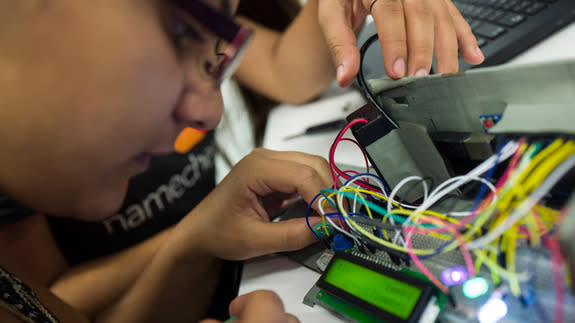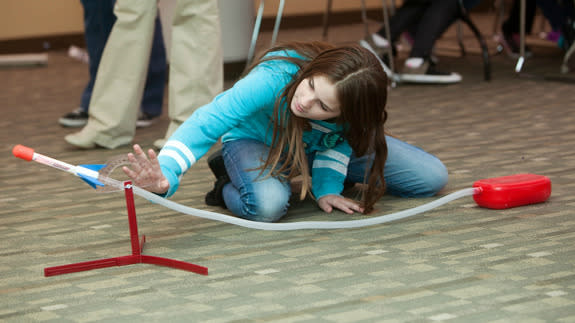These STEM initiatives are inspiring women and girls around the globe

Our society is inching toward a future when the phrase "you code like a girl" will be a compliment of the highest order.
But there are significant hurdles before we get there. The statistics behind women in STEM (science, technology, engineering and math) are still far from indicating an even playing field.
See also: To let girls in, the tech industry is thinking pink. But that isn't enough.
According to the U.S. Department of Commerce, female employees fill fewer than 25% of STEM jobs — even though they make up nearly half of the overall workforce. In the startup world, just 5% of women head up their own companies. And these disheartening numbers haven't changed much in the past decade.
It will likely take a combination of political activism and global societal shifts to truly make a difference, but there are glimmers of hope. Promising government initiatives, as well as NGOs, nonprofits, events and startups — all with the goal of introducing women and girls to STEM fields and futures — are on the rise.
And it's not just an American issue. Young women around the world are banding together and using technology to shatter the glass ceiling.
While this isn't nearly a comprehensive list, we've examined some impactful initiatives that are inspiring women to advance within STEM careers across the globe.
Global efforts to get our girls interested in STEM

Image: Flickr, COD Newsroom
Developed nations may have a leg up when it comes to introducing young girls to STEM careers, but often, an antiquated cultural status quo and a lack of governmental support can hinder real progress. In the developing world, even more challenges arise.
These regions — or at least pockets within them — are attempting to close the gender gap, one line of code at a time.
North and South America
Within the U.S., the White House has pledged not only to broaden the scope of STEM educational opportunities, but also to tackle the gender gap within technical and scientific fields — as well as encourage other underrepresented groups to pursue STEM careers.
Beyond government initiatives, programs like the New York Academy of Sciences' 1000 Girls — 1000 Futures, The Scientista Foundation and Million Women Mentors are just a few notable efforts making strides.
In Canada, nonprofits and programs such as hEr VOLUTION, the Society for Canadian Women in Science and Technology and the Canadian Coalition of Women in Engineering, Science, Trades and Technology (CCWESTT) are attempting to close the gap.
According to a 2012 study by the Elsevier Foundation, Brazil ranks first in STEM gender equality, largely due to progressive social policies, including state-funded tuition for young people. Ciência sem Fronteiras, or the Brazil Scientific Mobility Program, is a government initiative to send 75,000 Brazilian students abroad for STEM training and education. The private sector is also expected to fund or contribute to an additional 25,000 scholarships.
Asia
The UNESCO Bangkok report A Complex Formula: Girls and Women in Science, Technology, Engineering and Mathematics in Asia detailed a few of the challenges facing women in Asia. These include gender stereotypes, social anxiety and a lack of regional female role models in STEM fields.
At the time of the 2015 report, only three of 18 countries — the Philippines, Thailand and Kazakhstan — had equal or above-proportion representations of female researchers in science, tech and innovation.
But there are a few notable programs within the region that are starting to demonstrate progress.
In Singapore, for example, the nonprofit educational organization Destination Imagination provides a challenge-based atmosphere to encourage young girls to flex their creative skills in technical arenas. This series of workshops targets girls ages 10-15, and incorporates STEM-focused challenges such as designing or building vehicles.
Next door in Malaysia, the National Association of Women Entrepreneurs of Malaysia (NAWEM) is an NGO that unites female entrepreneurs in the fields of manufacturing, IT, aerospace, engineering and more. The organization fosters both personal growth and business networking connections, and provides members with opportunities to participate in international and community-based conventions, conferences and mentorship events.
Indian Girls Code, a free program in India led by robotics education company Robotix, is inspiring girls to become involved in computer science and technology. It focuses particularly on girls who come from underprivileged backgrounds. The movement is closely tied to the Indian Robotix League, which hosts an annual robotics competition and training event dedicated to young innovators.
The first iteration of the Indian Girls Code program was held at an all-girls orphanage in Trichy, and led 25 girls between the ages of 7-12 through a series of workshops, helping them learn to code and create "real-world applications for real-world problems."
Europe
The UK is another nation struggling with gender equality in STEM. One 2013 study found that, although 42% of mathematics undergraduates are female, only 6% of professors in the field are women.
Nordic regions and smaller European countries, meanwhile, sometimes struggle to provide as many opportunities as their wealthier neighbors. The latest report from the Gender Equality Index, which measures gender equality policies across 28 countries in the European Union, found that in the "work" category, women in Slovakia, Croatia, the Czech Republic and Italy ranked significantly low, indicating limited access to equal employment opportunities. The cause of this is largely speculation, but segregated labor markets, societal expectations and family structure might be factors.
Nevertheless, there's no shortage of organizations and initiatives attempting to tackle this issue throughout Europe.
The European Centre for Women and Technology is a partnership of more than 130 organizations that support women in tech from all over Europe. Additionally, the European Ada Awards makes a concerted effort to recognize women in technology, issuing annual awards such as "Digital Girl of the Year," "Digital Woman of the Year" and "Digital Impact Organization of the Year."
The WISE campaign is another example of a movement to recognize noteworthy accomplishments by women in science and technology, with the mission of adding another 1 million women to the STEM workforce in the UK.
Estonia has produced several events and programs over the past couple of years on a more regional level. Digigirls is a tech-focused event featuring high school students with an interest in IT, and TechSisters is a nonprofit working to inspire women within local communities.
Australia
The Australian government has made a significant push to get more women invested in STEM education and careers, and has pledged to invest $13 million over the next five years to make it happen.
The Science in Australia Gender Equity (SAGE) program, managed by the Australian Academy of Science and the Australian Academy of Technological Sciences and Engineering, aims to "improve the promotion and retention of women and gender minorities" within STEM. The pilot program launched in September 2015.
Women in Science AUSTRALIA is just one of many smaller-scale organizations addressing the issues outside of the government sector. The org employs a "pay it forward" approach to STEM, and appeals to both women and men championing the progression of gender equality in the STEM workforce.
Developing nations
There are a few organizations attempting to combat the many additional hurdles that women in underdeveloped countries face when addressing the gender gap in the workforce.
The Organization for Women in Science in the Developing World, which creates research training and networking opportunities for female scientists, and the Elsevier Foundation, an organization that provides grants to support scholars in the early stages of their careers, work together to recognize young women in "scientifically lagging developing countries" who are making notable contributions to their respective industries.
David Ruth, executive director of the Elsevier Foundation, called women an "untapped resource" in the developing world in a recent interview, explaining that by providing a source of recognition, the awards system fosters innovation.
In Ghana, the mentorship program Tech Needs Girls, spearheaded by entrepreneur Regina Agyare and her company Soronko Solutions, creates an environment for young women to learn computer skills. Currently, 205 girls and 15 mentors — female computer scientists and engineers — are enrolled in the program, the end goal of which is to get girls out of less-than-ideal situations and into universities.
Widespread impact
Other organizations focus on an international approach, stretching across borders and oceans to encourage women and young girls to pursue more technical career paths, classes or hobbies.
Technovation, an international entrepreneurship program for young women, is no stranger to girls in STEM who hail from every corner of the world. The 2014 competition saw finalists from five continents, and the winning team for the high school devision, Health in a Drop, came all the way from Moldova to claim victory.
At the 2015 competition, groups of young girls from around the globe submitted ideas for apps that addressed a social or environmental issue within their communities — and half of the finalist teams for the high school division presenting in Silicon Valley came from outside the U.S.
Many other internationally focused women-in-STEM organizations are aimed toward young girls or students, such as Little Miss Geek, a campaign that has encouraged more than 5,000 students to take part in its "tech pioneer" program. Nonprofit Girls in Tech has rapidly expanded across Europe to accelerate the careers of women in high-tech and entrepreneurial fields.
Rails Girls is another widespread program that operates in countries such as Germany, China and Singapore, though the company originally launched in Finland. The organization hosts workshops and events to rally for women who want to become programmers, offering tools to learn valuable skills and establish a foothold in the tech world.
When it comes to tackling the gender gap in the arena of science and tech on a global level, there's still a daunting amount of work to be done. The numbers are still grim in many parts of the world.
Women and girls still have many obstacles to overcome, rising above social stigmas and limited socioeconomic opportunities. But these organizations, programs and individuals — and many others like them — are putting up a good fight, and are slowly making gender equality in STEM a reality.
Want to learn more about how women and girls are breaking barriers in STEM? Watch CodeGirl, a new film by award-winning director Lesley Chilcott, on Mashable.com and our Apple TV app through Jan. 28, or at our special screening in L.A.

